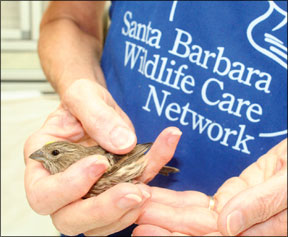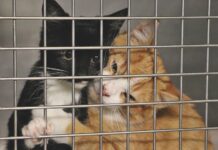Dear Elizabeth: I read with interest your column on songbird fever. I have several barn cats that perform a great service: keeping my barn free from mice and rats. I obviously cant confine the cats indoors where they wouldnt be able to continue doing their job. While I do worry about the risks the cats face outdoors, I cant return to the days before we had cats when rodents ran rampant in the barn. To me, these cats are worth their weight in gold, and I love them dearly. On occasion though, one of the cats, Marley, brings home live birds or baby rabbits or chipmunks – she seems to take great pride in dropping the wee creatures at my feet. Its always distressing to be presented with these frightened little animals, which are sometimes injured. What can I do to help these wild Bev Caldwell 288 animals that Marley insists on bringing home?
I do believe that CatWatch readers are the most kind-hearted souls on earth! Thank you for wanting to help these little creatures. Its very common for female cats to bring home prey. Mother cats will first bring home dead animals to their young kittens, teaching them to eat prey animals. When the kittens are a bit older, the moms will bring home wounded animals, and will show the youngsters how to kill. Its possible that Marley is attempting to teach you how to hunt.
The best thing that you can do when presented with an injured wild animal is to call a licensed wildlife rehabilitator for advice and assistance. Many well-meaning people are especially tempted to keep baby animals and care for them at home. Keeping wild animals – except to transport them to a wildlife rehabilitator – is against state and federal laws for lots of reasons. Many wild animals, even tiny babies, can transmit diseases to humans or other pets. Diseases, parasites or injuries may be difficult to detect and to treat, and each species requires specialized care.
Wildlife rehabilitators have the proper training and permits to legally and safely care for wildlife, and they work closely with veterinarians when dealing with sick or injured animals. Youngsters are best raised with others of their own species, so that they can learn proper social skills, and they need to be taught survival skills like finding their own food before they can be released.
Rehabilitators minimize the contact they have with the wild animal, remembering that the goal is to get the animal to the stage where it can be released back into the wild where an unnatural fondness for people could be a liability. For the very best chance at survival and for the safety of your family and pets, injured wildlife should be transferred to the care of licensed rehabilitators. An online list of rehabilitators can be found at this link: http://www.tc.umn.edu/~devo0028/contact.htm.
You can also find licensed wildlife rehabilitators through your town or county animal control office, humane society or local veterinarian. These groups or individuals usually will know local wildlife rehabilitators and can refer you to them.
So, to recap: Here is what to do with injured small wildlife:
(1) Before attempting to capture the animal, call a licensed wildlife rehabilitator.
(2) Keep people and pets away from the animal until you get advice from the rehabilitator. Place an overturned box, with small air holes cut into the sides, over the animal and place something heavy, like a rock, on the top so that the box cant easily be overturned or moved.
(3) To safely transport wildlife to a rehabilitator:
A. Find a suitable container (a box with small air holes poked in the sides or a pet carrier) and line it with a towel.
B. Place a towel over the animal and using leather gloves, pick up the animal and place it in the carrier. Even small mammals can bite and transmit diseases such as rabies to people. Do not take unnecessary risks.
C. Secure the carrier to make sure the animal cant escape.
D. Keep the container in a warm, dark place. Avoid peeking into the box … remember that you are perceived as a predator and any contact with you is stressful for the animal.
E. Transport the animal to the rehabilitator as soon as possible. Love, Elizabeth



